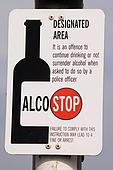
A friend of mine is a police officer who used to work the night shift. He once told me he had arrested an old high school acquaintance of ours for DUI. The facts of the incident were interesting. My officer friend had come upon a car parked on the side of the road about 10 feet from a driveway. The car was turned off and our high school acquaintance was inside the car asleep. The smell of alcohol emanated from the car. My friend woke up our acquaintance and had him step out of the car to take a blood alcohol test. Our acquaintance refused, insisting that he was not driving the car and that the car was parked in his girlfriend's driveway. The acquaintance was arrested on charges of DUI, taken to jail and lost his license for failing to take a blood alcohol test.
What makes the account interesting is that the State Attorney eventually dropped the charges against the acquaintance on the grounds (I believe) that there was not enough evidence to prove the acquaintance had driven the car. Interesting reasoning given the car was not actually parked in the driveway. The acquaintance also had his license reinstated even though there was no dispute that he had refused a blood alcohol test. I am certain these results were achieved for our acquaintance because he hired a DUI attorney to represent him. Even though our acquaintance was able to work out a deal, he had to spend months without a license. The following are some of the things our acquaintance should have known before he was faced with the circumstances that led to his arrest:
"Per Se" Blood Alcohol Concentration (BAC) Level
All states have DUI laws that deem any driver with a blood alcohol concentration (BAC) at or above .08 percent as "per se intoxicated." This means that drivers with a BAC at or above .08 are legally intoxicated, and no additional proof of driving impairment is necessary.
Enhanced Penalty Standards
Most states impose harsher penalties on DUI offenders with a particularly high BAC at the time of the offense. The penalties usually begin when the BAC is around .15. Penalties for DUI offenders with a BAC at or above their state's enhanced penalty standards range from harsher fines and driver's license restrictions to increased jail time
Implied Consent
Most states require drivers to submit to a breath, blood, or urine test if suspected of DUI. Failure to submit to such test can result in mandatory suspension of a driver's license, usually for six months to a year. This is called the "Implied Consent Law" because when you obtain your driver's license you implied consent to being tested.
Many states also have "Zero Tolerance" for underage drinking and driving.